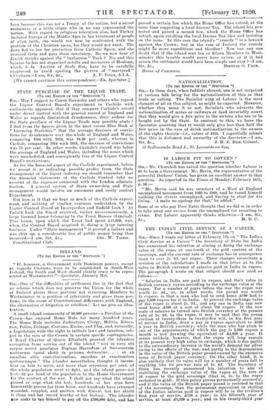STATE PURCHASE OF THE LIQUOR TRADE. (To THE EDITOR OF
THE " SPECTATOR."] SIR,—May I suggest to Canon Rawnsley and others who regard the Liquor Control Board's experiment in Carlisle with enthusiastic approval, that if they compare Carlisle's record tinder direct control with the general record of England and Wales as regards diminished drunkenness, their ardour for the State purchase of the Liquor Trade may possibly abate P I find from the figures given in the most recent Blue Book of " Licensing Statistics" that the average decrease of convic- tions for drunkenness over the whole of England and Wales, comparing 1914 with 1918, was 84.50 per cent., whereas in Carlisle, comparing 1914 with 1918, the decrease of convictions was 71 per cent. In other words, Carlisle's record was below the average of England and Wales, including the areas which were unscheduled, and consequently free of the Liquor Control Board's restrictions.
As for the financial aspect of the Carlisle experiment, before we accept it as indicating possible profits from the State management of the liquor industry we should remember that the financial statements of the Carlisle Control take no account of the expenses connected with the London adminis- tration. A general system of State ownership and State management would involve an enormous and costly central Department.
But how is it that we hear so much of the Carlisle experi-
ment, and nothing of similar ventures undertaken by the Liquor Control Board at Invergordon and Enfield Lock ? At Enfield Lock the Board acquired, rather unceremoniously, a large licensed house belonging to the Trust Houses (Limited). This house, upon which the Trust had spent £11,000, was, when the Control Board acquired it, doing a large catering business. Under " State management" it proved a failure and was shut up, a considerable loss of public money being thus


































 Previous page
Previous page